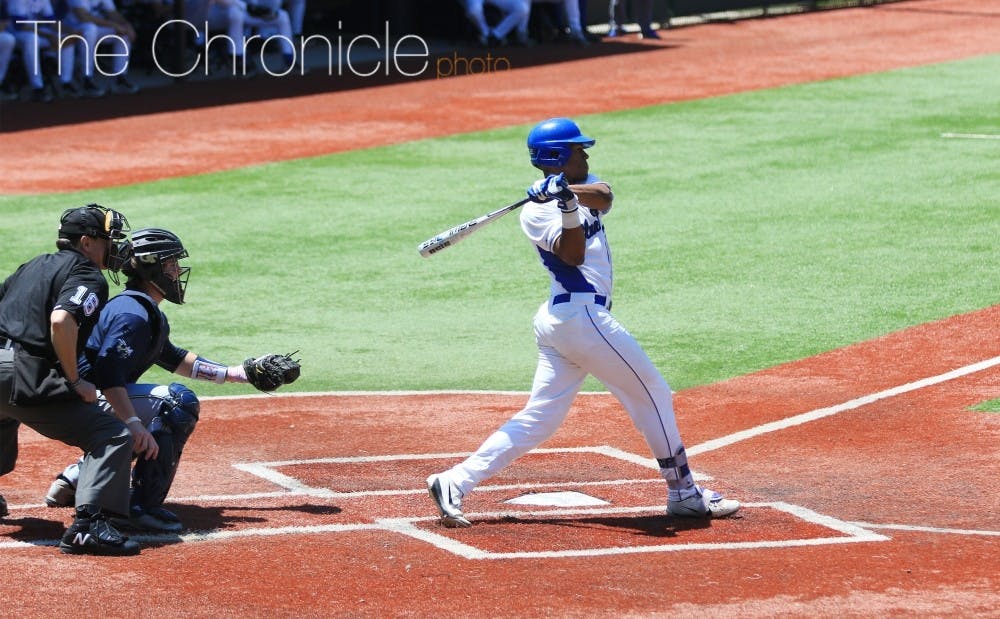Baseball prospects are notorious for not living up to expectations.
The minor leagues are littered with former highly-touted players. Few top draftees make it to the major leagues, and those that do don’t always become stars.
But new research from Duke Health could help teams better evaluate who will make it.
According to a study of 252 major and minor league players published Jan. 8 in the journal Scientific Reports, players who scored higher on electronic vision and motor skills tests through a program called Nike Sensory had better plate discipline—they got on base more, walked more and struck out less.
“Baseball organizations are competing against one another to get as much information as possible about a player to increase the accuracy of their internal projections,” lead author Kyle Burris, a Duke statistician and Ph.D. candidate said in an email. “While visual-motor testing likely won't fundamentally change baseball scouting until we know a lot more about how the brain works, teams could incorporate this information into their evaluations.”
Advanced analytics like these have become more and more common in the world of baseball—the 2017 World Series Champion Houston Astros rely heavily on a computer analytics system, as do many other professional teams.
“It's an incredibly booming field right now,” Burris said in a video. “There's a tremendous demand for athletes to be able to maximize their peak performance.”
The players in the study used large touch-screen devices to complete different exercises, which resembled video games. The exercises test users' vision and ability to pick up small details, which a press release describes as similar to being able to recognize a pitcher’s grip on the ball before it is thrown, which could help the hitter anticipate what type of pitch is coming.
High scores on a test of a player’s ability to recall and recreate patterns correlated with better skill at reaching base, and better scores in hand-eye coordination and reaction time correlated with one’s skill at inducing walks, the release said. On the other hand, high spatial recognition scores correlated with an ability to avoid striking out.
All of these factors could help scouts better determine who has the chops to handle major league pitching.
Burris, a longtime baseball and sports fan who will work for the Cleveland Indians as an analyst this summer, wrote that he has talked to many teams about the work, and they're interested in learning more.
“Many teams are using this type of technology, but don't quite know what to do with the information,” Burris wrote. “For the foreseeable future, teams will be using these types of tools for internal scouting, since they're able to test their own players.”
Burris noted that the exercises could eventually become a training mechanism for plate discipline. Literature has shown that many of the skills related to on-field performance can be improved by training, he wrote. Still, he said it is unclear whether those improvements could actually materialize on the field.
One shortcoming of the research is that only plate discipline skills correlate with better scores on the exercise—not other statistics like slugging percentage, which measures a hitter’s power.
“In future collaborative work, we'd ideally like to use pitch-level data to determine the influence of visual-motor ability on various components of plate discipline,” Burris wrote. “For example, do players with slower reaction times struggle with velocity up in the zone? Are players with higher perception spans able to better differentiate between fastballs and curveballs on two-strike counts?”
Get The Chronicle straight to your inbox
Signup for our weekly newsletter. Cancel at any time.

Managing Editor 2018-19, 2019-2020 Features & Investigations Editor
A member of the class of 2020 hailing from San Mateo, Calif., Ben is The Chronicle's Towerview Editor and Investigations Editor. Outside of the Chronicle, he is a public policy major working towards a journalism certificate, has interned at the Tampa Bay Times and NBC News and frequents Pitchforks.

